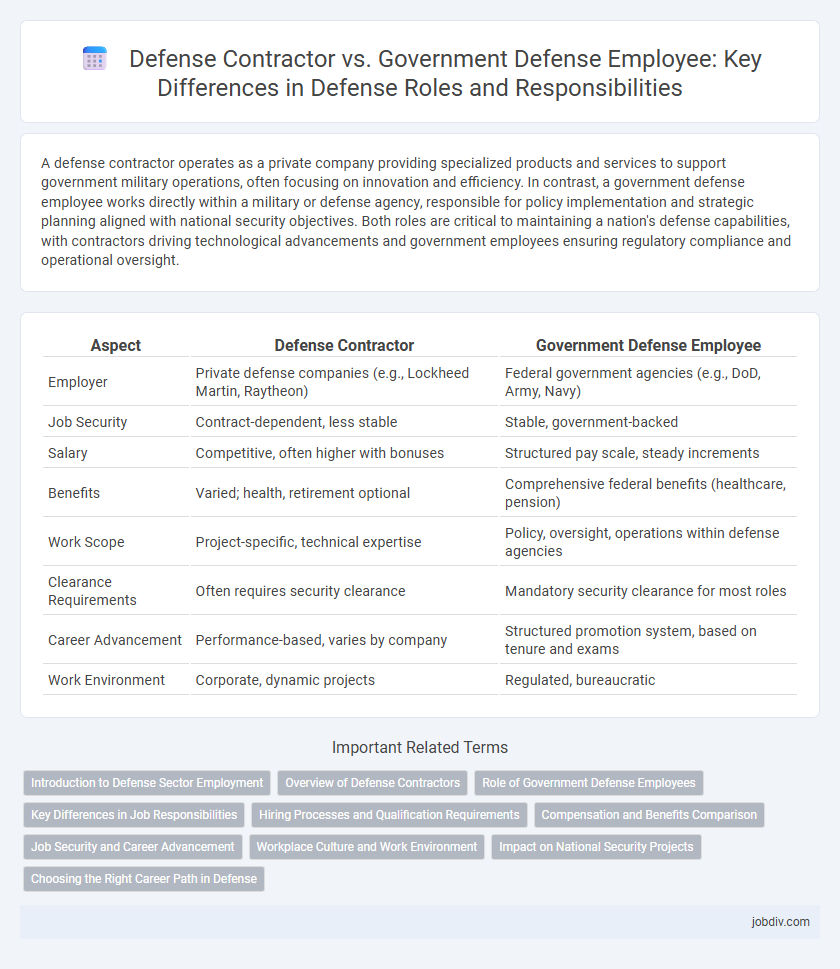A defense contractor operates as a private company providing specialized products and services to support government military operations, often focusing on innovation and efficiency. In contrast, a government defense employee works directly within a military or defense agency, responsible for policy implementation and strategic planning aligned with national security objectives. Both roles are critical to maintaining a nation's defense capabilities, with contractors driving technological advancements and government employees ensuring regulatory compliance and operational oversight.
Table of Comparison
| Aspect | Defense Contractor | Government Defense Employee |
|---|---|---|
| Employer | Private defense companies (e.g., Lockheed Martin, Raytheon) | Federal government agencies (e.g., DoD, Army, Navy) |
| Job Security | Contract-dependent, less stable | Stable, government-backed |
| Salary | Competitive, often higher with bonuses | Structured pay scale, steady increments |
| Benefits | Varied; health, retirement optional | Comprehensive federal benefits (healthcare, pension) |
| Work Scope | Project-specific, technical expertise | Policy, oversight, operations within defense agencies |
| Clearance Requirements | Often requires security clearance | Mandatory security clearance for most roles |
| Career Advancement | Performance-based, varies by company | Structured promotion system, based on tenure and exams |
| Work Environment | Corporate, dynamic projects | Regulated, bureaucratic |
Introduction to Defense Sector Employment
Defense contractors specialize in providing technology, equipment, and services to government defense agencies through private sector firms, often handling project-based work with a focus on innovation and cost-efficiency. Government defense employees operate within federal agencies such as the Department of Defense, performing roles that involve policy implementation, strategic planning, and direct oversight of defense programs. Employment in the defense sector offers diverse career paths, with contractors emphasizing market-driven solutions and government employees ensuring regulatory compliance and national security priorities.
Overview of Defense Contractors
Defense contractors provide specialized services, advanced technology, and manufacturing capabilities crucial for military operations, often supporting multiple branches of the armed forces. These private sector companies offer flexible solutions that can be rapidly scaled to meet evolving defense requirements and innovation demands. Their role complements government defense employees by delivering expertise and resources that enhance overall national security.
Role of Government Defense Employees
Government defense employees develop and enforce policies, oversee procurement, and ensure compliance with national security regulations, acting as stewards of public defense resources. They coordinate with defense contractors to align projects with strategic military objectives and maintain accountability throughout the acquisition process. Their role is critical in safeguarding national interests through stringent oversight and interagency collaboration.
Key Differences in Job Responsibilities
Defense contractors typically handle specialized projects, providing technical expertise and support for defense systems, often working on contract-based assignments with strict deliverables and deadlines. Government defense employees focus on policy implementation, operational planning, and oversight of defense programs within the military or defense agencies, ensuring compliance with regulations and national security objectives. Contractors usually operate under private sector protocols, while government employees maintain authority in strategic decision-making and long-term defense initiatives.
Hiring Processes and Qualification Requirements
Defense contractors undergo a competitive bidding process where firms submit detailed proposals demonstrating specialized expertise, security clearances, and compliance with government regulations, while government defense employees face rigorous civil service examinations, background checks, and meet strict educational and experience benchmarks for federal employment. Contractors often require industry certifications like Defense Acquisition Workforce Improvement Act (DAWIA) credentials, whereas government employees must fulfill federal job classification standards and stringent physical and psychological evaluations. Both roles prioritize national security clearance levels such as Confidential, Secret, or Top Secret, influencing eligibility and access in the hiring process.
Compensation and Benefits Comparison
Defense contractors often receive higher base salaries compared to government defense employees, reflecting market-driven pay scales and specialized skill demands. Government defense employees benefit from comprehensive retirement plans, including pensions and Thrift Savings Plan (TSP) options, alongside extensive health insurance and retirement security. Contractor compensation may include performance bonuses and stock options, but typically lacks the long-term job security and federal benefits characteristic of government positions.
Job Security and Career Advancement
Defense contractors often face fluctuating job security due to contract-based employment and project funding cycles, whereas government defense employees benefit from stable, long-term job security backed by federal employment regulations. Career advancement for government defense employees typically follows a structured path with clear promotion criteria and access to training programs, while contractors rely on performance, networking, and contract renewals to progress. The government sector provides more predictable benefits and retirement plans, contrasted with the variable incentives commonly offered by defense contractor firms.
Workplace Culture and Work Environment
Defense contractors typically operate within a fast-paced, project-driven workplace culture emphasizing innovation and contractual milestones, often with flexible work arrangements tailored to client requirements. Government defense employees experience a more structured environment governed by stringent regulations, standardized procedures, and hierarchical decision-making, promoting stability and long-term career development. Both settings prioritize security clearances, but government roles usually offer greater job security and benefits, while contractors benefit from exposure to diverse projects and technologies.
Impact on National Security Projects
Defense contractors bring specialized expertise and cutting-edge technology to national security projects, enabling rapid innovation and scalability. Government defense employees provide critical knowledge continuity and ensure strict compliance with security protocols and classified information handling. The collaboration between contractors and government personnel strengthens project outcomes by balancing innovation with operational integrity.
Choosing the Right Career Path in Defense
Selecting between a defense contractor and a government defense employee hinges on career goals, job stability, and work environment preferences. Defense contractors offer dynamic project-based roles with potential for higher salaries and exposure to diverse defense technologies, while government defense employees benefit from job security, comprehensive benefits, and policymaking involvement. Understanding the distinctions in responsibilities, advancement opportunities, and workplace culture is essential for making an informed decision in the defense sector.
Defense Contractor vs Government Defense Employee Infographic

 jobdiv.com
jobdiv.com